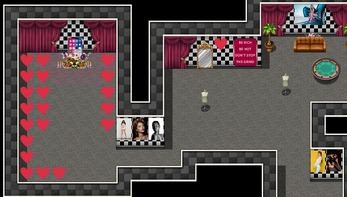RP5 - Social Media Consumption
A downloadable game for Windows
E. Lindberg
Design and its Discontents
RP5 Written Statement
While collecting daily ephemera and journaling about my observed consumption habits for my 30 day collection blog, I noticed how my phone created daily summaries of what apps I most frequently used and how much time I spent using them.
During a time when more and more social activities were forced to go virtual, people sought company through social media, hoping to connect with others. Finding oneself in a bubble often leads to a degradation of mental health- one may compare their life to those they see promoted to them, applauded and seen as desirable. People can experience a feeling of missing out, or their social media usage and compound feelings of inadequacy leading to increased instances of depression and anxiety. These glamorous lifestyles remain elusive, and products are hawked, preying upon the masses.
Social media usage can also lead to political radicalization. People who feel isolated or believe they’ve been slighted by the world are especially vulnerable. Misinformation spreads like wildfire through social media communities and people find themselves following false prophets. In their essay Radicalization and the Use of Social Media, Thompson states “It lures its users with a promise of friendship, acceptance, or a sense of purpose. It is an addiction for half of its users. Users may one day find themselves down the proverbial radical rabbit hole, unsure of how they ended up there.” In uncertain times when people feel especially isolated and insecure about the future, there’s even more draw to finding purpose and community through social media; but some outlets are far more insidious than others.
For this project I decided to venture into an area of design I hadn’t stepped foot in before- game design. I believe that a game where the user commanders the character on the screen leads to a more immersive experience and reflects the feelings and experiences I wished to portray through the game. The interactions with characters in this game are designed to reflect and parodize behaviors I’ve observed online through my own usage of social media. For reference, the websites and apps I’ve used include YouTube, Tumblr, Twitter, 4Chan, and Instagram. The small doorless, windowless room the main character lives in represents physical or perceived isolation. The labyrinth the main character enters after unlocking the phone further symbolizes the vast, winding space of the internet further creating a sense of isolation.
References
Keracher, M., 2016. #StatusofMind. [online] Rsph.org.uk. Available at:
<https: www.rsph.org.uk="" static="" uploaded="" d125b27c-0b62-41c5-a2c0155a8887cd01.pdf=""> [Accessed 11 December 2021]. </https:>
SocialPro. 2021. Isolation and Social Media: A Downward Spiral | SocialPro. [online] Available
at: <https: socialpronow.com="" blog="" social-life-companion="" isolation-social-media=""> [Accessed 10 December 2021]. </https:>
Stecula, Dominik & Pickup, Mark. (2021). Social Media, Cognitive Reflection, and Conspiracy
Beliefs. Frontiers in Political Science. 3. 10.3389/fpos.2021.647957.
Thompson, Robin L.. "Radicalization and the Use of Social Media." Journal of Strategic
Security 4, no. 4 (2012) : 167-190. DOI: http://dx.doi.org/10.5038/1944-0472.4.4.8
University of Nevada, Reno. 2021. Impact of Social Media on Youth Mental Health | University
of Nevada, Reno. [online] Available at:
<https://onlinedegrees.unr.edu/online-master-of-public-health/impact-of-social-me...
ia-on-youth-mental-health/> [Accessed 11 December 2021].
Download
Install instructions
Please unzip the file, open Project1, and launch the application named "Game." Use the up, down, left, and right arrows to move in game and press the enter key to make selections.

Leave a comment
Log in with itch.io to leave a comment.